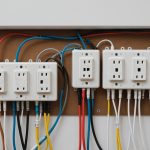Understanding Electrical Wiring Age and Home Insurance Costs
When it comes to home insurance premiums, one significant factor that insurers assess is the electrical wiring age. Older wiring systems can pose higher risks due to potential faults, increasing the likelihood of electrical fires. Therefore, insurers deem it crucial to evaluate the age and condition of a home’s wiring during insurance evaluations. Homes with updated wiring systems are considered safer and are often rewarded with lower premiums.
Importance of Up-to-Date Wiring
Having modern electrical wiring in place is not just a matter of safety, but also economically advantageous. Up-to-date wiring reduces the risk of accidents and thus can make your home more insurable. Insurers consider modern systems less risky, which often leads to more competitive insurance premiums. This aspect is especially vital in areas with specific trends, such as those observed in Liverpool.
En parallèle : Mastering Your Renovation Budget: Tips for Transforming a Mid-Century Modern Home in Sussex
Wiring Age Impact on Premiums in Liverpool
Liverpool insurance trends show a marked impact of wiring age on home insurance costs. Homes with outdated electrical systems often face higher insurance costs as they represent a substantial risk for insurers. On the other hand, houses with recent wiring installations usually enjoy reduced rates, emphasizing the importance of maintaining an updated electrical infrastructure.
Statistical Analysis of Wiring Age and Insurance in Liverpool
Exploring the wiring age statistics in Liverpool reveals a pivotal factor influencing Liverpool home insurance rates. Homes with outdated electrical systems are often seen as higher risk, impacting insurance statistics substantially.
En parallèle : Unlocking Rural Land Potential: The Impact of Comprehensive Soil Testing on Your Somerset Land Purchase Decision
Recent Insurance Rate Trends
In recent years, insurance rates in Liverpool have shown a nuanced pattern. Older homes, particularly those with wiring dating back several decades, have experienced higher premiums. This is primarily due to the increased risk of electrical faults and fires associated with older electrical setups.
Wiring Age in Liverpool Homes
The age of home wiring significantly affects Liverpool home insurance premiums. Older homes with outdated wiring often face higher insurance costs due to increased perceived risk. There’s a direct correlation observed between wiring age and home insurance premiums, highlighting the importance of updated electrical systems for homeowners seeking affordable coverage.
- Wiring Age: A critical factor impacting Liverpool insurance statistics.
- National Trends: Comparatively, Liverpool’s insurance trends align with national patterns, where homes with modern wiring tend to enjoy better insurance rates.
- Surrounding Areas: Liverpool’s situation mirrors that of other cities, emphasizing a widespread concern over wiring age in insurance calculations.
Understanding these factors helps homeowners make informed decisions about upgrades and potential savings on insurance costs.
Expert Opinions and Industry Insights
In the realm of electrical safety, knowledge from insurance experts proves invaluable. They often highlight that older homes with aging wiring present unique risks. According to several prominent agents, inadequate or deteriorating wiring can significantly affect your insurance premiums due to potential hazards like electrical fires.
Wiring recommendations are a focal point for both insurers and electricians. Experts emphasize the importance of updating outdated electrical systems. Not only does this mitigate risks, but it also benefits homeowners with potential reductions in insurance costs. Insurance companies typically favour proactive safety measures over reliance on the age of wiring when assessing coverage options.
Electricians shed light on common issues found with aging wiring, such as corroded connections or outdated materials like aluminum wiring—which may lead to increased risk of fires. They recommend regular maintenance and timely upgrades. This step ensures both safety and compliance with modern standards.
When it comes to electrical upgrades, insurers take a positive stance. They view such improvements as a risk reduction measure. Upgraded systems tend to be more reliable, leading to fewer claims. Both homeowners and insurers benefit from reduced risks, fostering a safer living environment with potentially lower premiums.
Tips for Homeowners on Wiring Maintenance and Upgrades
Being proactive about wiring maintenance can save homeowners not only money but also provide peace of mind. Worn or outdated wires can pose significant risks.
Recognizing Signs of Aging Wiring
To avoid these hazards, it’s essential to recognize aging wiring signs. Look for frequent electrical surges or dimming lights, as these may indicate old wiring. Additionally, buzzes from switches or warm outlets can be warning signals. Addressing these efforts promptly can make a significant difference.
Steps for Upgrading Electrical Systems
Upgrading electrical systems includes several vital steps. Begin with a professional inspection to ascertain the current state. It’s wise to engage reliable contractors who offer recommendations tailored to your needs. Consider modern options such as energy-efficient wiring to reduce future expenses. Once upgrades are decided upon, ensure compliance with local regulations for safety.
- Conduct regular inspections.
- Hire licensed professionals for enhancements.
- Consider the benefits of energy-efficient upgrades.
Do not underestimate the impact of these upgrades. An upgraded system can potentially lower insurance rates, providing savings on premiums. Thus, keeping an up-to-date system is a financially savvy move for any forward-thinking homeowner.
Taking care of your wiring not only enhances safety but can also lead to potential insurance savings, demonstrating that prevention is truly better than cure.
Local Regulations and Insurer Guidelines
Understanding Liverpool housing regulations is crucial for maintaining the safety and insurability of your property. In Liverpool, the regulations regarding electrical safety standards are stringent, designed to ensure the safety of residents and protect property values. These regulations outline specific compliance measures, such as maintaining up-to-date electrical systems and regular inspections. More importantly, electrical code compliance is not just a legal obligation; it’s a fundamental requirement for insurance eligibility.
Insurers in Liverpool have strict insurance requirements that align with these local standards. Insurance providers assess wiring conditions meticulously before offering a policy. If your property’s electrical setup doesn’t meet their standards, securing coverage becomes problematic. Consequently, updating your property’s wiring to comply with regulations can directly affect your policy eligibility and premium rates.
Failure to adhere to local standards can have significant repercussions. Properties not aligned with these regulations may face insurance policy cancellations or increased premiums. Moreover, the potential for claims denial in case of an electrical fire or related damage looms large. Thus, adhering to these guidelines not only safeguards your home but also ensures a smoother insurance process. By prioritising regulatory compliance, homeowners can mitigate risks, ensuring safety and financial peace of mind.











